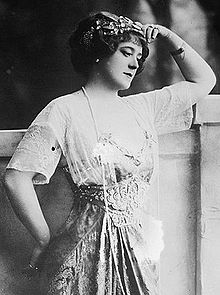Frieda Hempel

Frieda Hempel (26 June 1885 – 7 October 1955) was a German soprano singer in operatic and concert work who had an international career in Europe and the United States.
Biography
Frieda Hempel was born in Leipzig, Germany, and studied first at the Leipzig Conservatory and afterwards at the Stern Conservatory, Berlin, where she was a pupil of Selma Nicklass-Kempner. Her earliest appearances were in Breslau, singing Violetta, the Queen of the Night and Rosina. She made a debut in Schwerin in 1905, and was engaged there for the next two years, singing also Gilda, Leonora (Il trovatore) and Woglinde.
She made such a success that the Kaiser Wilhelm II requested the Schwerin authorities to release her to sing also in Berlin. She made a debut there in 1905 as Frau Fluth (in Nicolai's Die lustigen Weiber von Windsor). She sang at the Royal Court Opera, Berlin, from 1907 to 1912, where she was also admired as Lucia, Marguerite de Valois and Marie.
International career
She appeared at the Covent Garden, London in 1907 as Bastienne, as Humperdinck's Hänsel und Gretel, as Eva and Elsa and again as Frau Fluth: Melba and Selma Kurz were taking centre stage in the more popular roles.
In 1912 she made her debut at the Metropolitan Opera, in New York City as Marguerite de Valois in Les Huguenots. She sang regularly in New York thereafter into the 1920s. She was the first to sing the Marschallin in Der Rosenkavalier in New York (for Gatti-Casazza, December 9, 1913) and in Berlin, and she also sang the role in London in 1913. She was in the Met 1913 Un ballo in maschera as Oscar, with Caruso, Emmy Destinn, Margarete Matzenauer and Pasquale Amato, and with them in Boito's Mefistofele; also the 1916 Marriage of Figaro with Matzenauer, Geraldine Farrar and Antonio Scotti. Her La fille du régiment was presented there in 1917. Hempel had a very wide dramatic range, from Rosina or Queen of the Night to Wagner's Eva and Weber's Euryanthe (Metropolitan, 1914 revival).
Recitals
After 1919 she devoted herself to concert recitals, and left the Metropolitan Opera House somewhat abruptly, making way for the career of Amelita Galli-Curci. However she then made a second career on the concert platform, excelling in the performance of lieder of Mozart, Schubert, Schumann, Brahms and Wolf, in Mozart concert arias, and the like. She became famous for recitals in which she appeared in costume as the famous nineteenth-century soprano Jenny Lind.
Death
She died in Berlin in 1955.
Recordings
She began making records for Odeon Records in 1906 and later made recordings for the Gramophone Company(HMV) as well as the Victor Talking Machine Company and Edison Records. Most are by the acoustic process.
Teaching
Her vocal students include the American voice teacher and Bel canto scholar Cornelius L. Reid.
Sources
- A. Eaglefield-Hull, A Dictionary of Modern Music and Musicians (Dent, London 1924).
- G. Kobbé, The Complete Opera Book (Putnam, London 1935 printing).
- H. Rosenthal and J. Warrack, The Concise Oxford Dictionary of Opera (OUP, London 1974 printing).
- M. Scott, The Record of Singing Volume I (Duckworth, London 1977).

